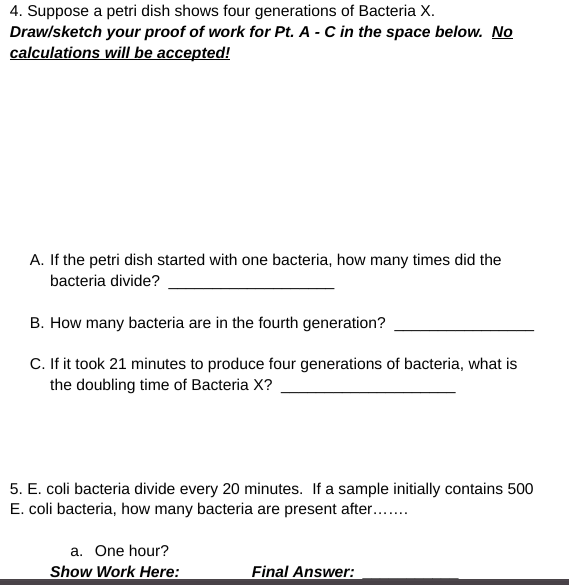Suppose a petri dish shows four generations of Bacteria X. If the petri dish started with one bacteria, how many times did the bacteria divide? How many bacteria are in the fourth... Suppose a petri dish shows four generations of Bacteria X. If the petri dish started with one bacteria, how many times did the bacteria divide? How many bacteria are in the fourth generation? If it took 21 minutes to produce four generations, what is the doubling time of Bacteria X? E. coli bacteria divide every 20 minutes. If a sample initially contains 500 E. coli bacteria, how many bacteria are present after one hour?

Understand the Problem
The question is asking about bacterial division over several generations, requiring calculations related to both the number of times bacteria divide and the final count of bacteria. It also looks to determine the doubling time of a specific bacteria population based on a given time frame.
Answer
A. $4$; B. $16$; C. $5.25$ minutes.
Answer for screen readers
A. The bacteria divide $4$ times.
B. There are $16$ bacteria in the fourth generation.
C. The doubling time of Bacteria X is $5.25$ minutes.
Steps to Solve
-
Determine the number of divisions To find out how many times the bacteria divide, we note that each generation represents a complete division. Thus, if there are four generations, the bacteria divide 4 times.
-
Calculate the fourth generation bacteria count If the petri dish starts with 1 bacterium, the number of bacteria after each generation is doubled. The formula for the number of bacteria after $n$ generations is $N = N_0 \times 2^n$. Here, (N_0 = 1) and (n = 4): $$ N = 1 \times 2^4 = 16 $$
-
Find the doubling time If producing four generations took 21 minutes, the time for one doubling (or one generation) can be calculated by dividing the total time by the number of generations: $$ \text{Doubling time} = \frac{21 \text{ minutes}}{4} = 5.25 \text{ minutes} $$
A. The bacteria divide $4$ times.
B. There are $16$ bacteria in the fourth generation.
C. The doubling time of Bacteria X is $5.25$ minutes.
More Information
Each division results in a complete doubling of the bacteria population. Understanding this exponential growth is key to calculating future generations and their counts.
Tips
- Mistaking the number of generations for the number of divisions. Remember: if there are four generations, the number of divisions is one less than that.
- Forgetting to double the initial population for each generation can lead to underestimating the final count.
AI-generated content may contain errors. Please verify critical information